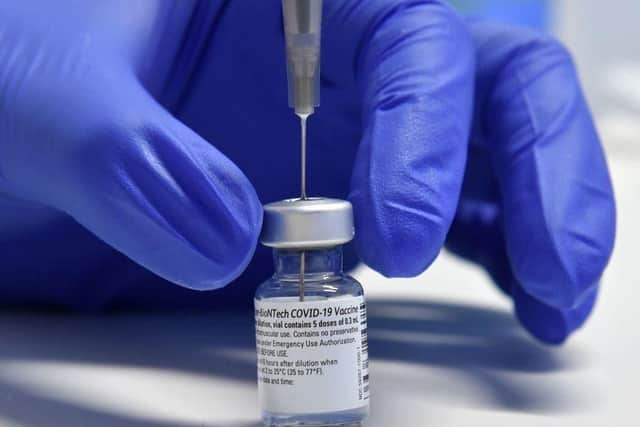What you need to know as Pfizer vaccine approved for use in 12- to 15-year-olds
and live on Freeview channel 276
The Medicines and Healthcare products Regulatory Agency (MHRA) authorised its use on Friday (June 4), saying it is safe and effective in this age group and the benefits outweigh the risks.
The vaccine is already approved for use in people aged 16 and over.
Advertisement
Hide AdAdvertisement
Hide AdThe Joint Committee on Vaccination and Immunisation (JCVI) will now decide whether children should get the jab.
Are children in other countries being vaccinated?
The US began inoculating young adolescents in May after its Centre for Disease Control and Prevention (CDC) approved the Pfizer jab for those aged 12-15. More than 600,000 children have been vaccinated so far.
The jab has also been approved for emergency use in Chile, Canada, Japan, the Philippines, Israel and Dubai and the European Union.
How effective is the Pfizer vaccine?


A study, involving more than 2,000 adolescents in the US, has shown the jab to be safe and effective in 12- to 15-year-olds.
Advertisement
Hide AdAdvertisement
Hide AdThe trial investigators said the Pfizer vaccine was 100% effective at preventing Covid-19 disease, although the true rate could be between 75% and 100%.
In adults, phase three clinical trials have shown the vaccine to be around 95% effective in preventing people from developing coronavirus symptoms.
How does the vaccine work?
The Pfizer jab is a messenger RNA (mRNA) vaccine.
Conventional vaccines are produced using weakened forms of the virus, but mRNAs use only the virus’s genetic code.
An mRNA vaccine is injected into the body, where it enters cells and tells them to create antigens.
Advertisement
Hide AdAdvertisement
Hide AdThese antigens are recognised by the immune system and prepare it to fight coronavirus.
Some believe mRNA vaccines are safer for the patient as they do not rely on any element of the virus being injected into the body.
Do children need to be vaccinated?
Children rarely develop severe forms of Covid-19, and deaths from the disease are rarer still (fewer than two out of every million worldwide).
But, on rare occasions, young people who have been infected can later develop a dangerous condition called multi-system inflammatory syndrome in children (MIS-C), which can damage the brain and cause hallucinations.
Advertisement
Hide AdAdvertisement
Hide AdEvidence is also building that jabs can block coronavirus transmission, so vaccinating children could save other people’s lives and help contribute to herd immunity – the point at which most of a population is immune to an infectious disease.
Are there any side-effects?
The most common side-effects in children aged 12 to 15 are similar to those in people aged 16 and over.
They include pain at the injection site, tiredness, headache, muscle and joint pain, chills and fever.
These effects are usually mild or moderate and improve within a few days.
Advertisement
Hide AdAdvertisement
Hide AdRecipients can report any side-effects they experience via the MHRA’s existing Yellow Card scheme found on its website.
Support us and become a subscriber today. Enjoy unlimited access to local news, the latest football stories and new puzzles every day.
With a digital subscription, you can see fewer ads, enjoy faster load times, and get access to exclusive newsletters and content. Click here to subscribe.
Comment Guidelines
National World encourages reader discussion on our stories. User feedback, insights and back-and-forth exchanges add a rich layer of context to reporting. Please review our Community Guidelines before commenting.
